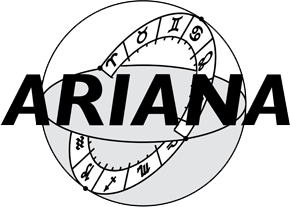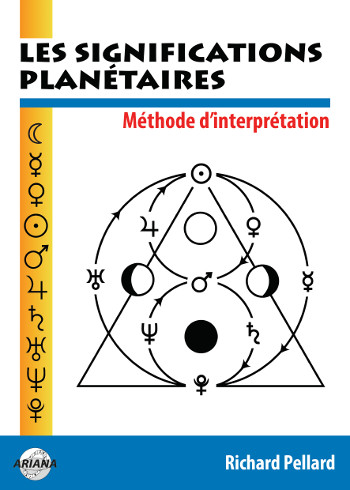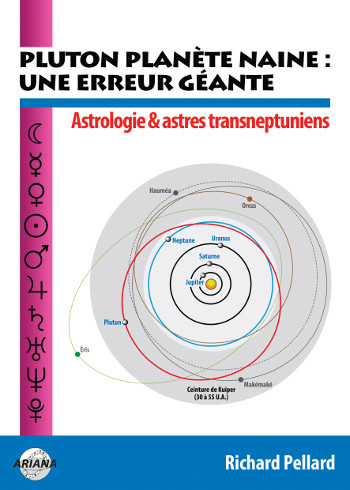Your Planets
Portraits of the Planets
Aspects between Planets
The planetary ages
The planetary families
Planets in Signs
The Planets in comics


The interpretation examples that we are suggesting are very far from being exhaustive : they only show and outline a general frame describing the issues of the aspect. They should therefore not be taken literally. Each being brings indeed its own responses, more or less original, to the questions raised by an aspect. There is no magic formula. Through using the R.E.T. and the Theory of Ages and combining logic, observation and imagination, you will be able to develop a thousand other possible meanings, a thousand other variations on the same theme.
“Small t” issue (intensive transcendance). How to blend switching from the duo-duel to the multiple (Saturn ‘tE’) with maintaining the absolute multiple (Pluto ‘tT’)? How to operate together an experimental scepticism and maximum aloofness? How to ponder the complexities of experience while staying inscrutable? This aspect excludes levels ‘R’ (communicative sociability), ‘r’ (decisive willpower) and ‘e’ (affective sensoriality).
You maintain, in one way or another, whether by abstract reason or by an imperturbable phlegm, a cold and intense distance vis-à-vis beings, things and situations. A shrewd and subtle observer of facts, you have no illusions about anything or anyone. The only thing that counts for you is the essential invisible to the eyes, the unknown reverse side of the decor where the universal laws lurk, the hidden order of the world. Auscultating the experience and trusting your deep intuition of the mystery, you constantly ask yourself the fundamental questions, those which have only partial, paradoxical or enigmatic answers. The most difficult abstractions have no secrets for you, and the unknown is your favorite field. Complex, subtle, secretive, you do not easily reveal your opinions or intentions, or only do so with the utmost caution and circumspection. If you have a taste for power, it is for the shadows and behind the scenes that it is.
Balanced dissonance : you switch alternately from an experimental scepticism (Saturn) to a cold insightful aloofness (Pluto), without being able to bring yourself to choose. Depending on whether one or the other function dominates in your experience, you can adopt the following attitudes :
If and when Saturn dominates : you seek to ward off the absurdity or the nothingness of all reason or all knowledge by developing a cold rationalism rooted in experimental realism. You pathetically try to find, in your cold, deep and methodical investigations into matter and lived experience, the why and how of immaterial mysteries, metaphysical or otherwise, without being able to bring yourselves to the certainty that there are questions which have and never will have an answer. The complete unknown fascinates you and worries you at the same time, and with the same intensity. By your abstract reason or your painful and desperate romanticism, you try in vain to rebel against an obscure and implacable fatality, against the forces of chaos, disorder and nothingness. Solitary, melancholy, skeptical and misunderstood, you fear that your situation will get even worse…
If and when Pluto dominates : intimately and intuitively convinced that basically, nothing is worth anything and that even the most in-depth research only ever leads to unfathomable and inexpressible mysteries, you come to the point of not even asking yourself the slightest fundamental question concerning the hidden contents of existence. The most subtle reasonings and the most perspicacious investigations into the heart of the matter of beings, things and situations appear to you like porridge, imbued as you are with the sense of the absurd or the unknowable. Wanting to transform the present, even in the most realistically pessimistic way, seems like a pleasant utopia to you. All you have left then is a deep and incurable despair, nihilistic temptations or the mystical or philosophical refuge in the arid lands of being-in-itself, hoping perhaps that your night will give birth to another sun.
If you learned to control this dissonance, you know that there is a time for experimental curiosity and a time for deep intuitive brainstorming, and know how to flawlessly alternate these two functions.
If you managed to sublimate this dissonance, you have deliberately sacrificed any disenchanted pursuit of the hidden meaning of your experiences for the sake of a silent inner quest for your deep genuine self ; or you have abdicated any inclination towards absurdity and anarchism in favour of a laborious experimental research.
▶ Introduction aux significations planétaires
▶ The Saturnian: Psychological profile
▶ The saturnian function ‘tE’ (transcendence of Existence)
▶ Saturnian stage (from 12 to 30 years old): the age of questioning
▶ Mars-Jupiter-Saturn: extensive Existence
▶ Mercury-Saturn-Pluto: intensive transcendence
▶ The Plutonian: Psychological profile
▶ The plutonian function ‘tT’ (transcendence of Transcendence)
▶ Uranian stage (from 30 to 84 years old): the age of individualization
▶ Plutonian stage (from 164 to 248 years old): the age of disappearance
▶ Uranus-Neptune-Pluto: extensive Transcendence
▶ Mercury-Saturn-Pluto: intensive transcendence

Les significations planétaires
par
620 pages. Illustrations en couleur.
La décision de ne traiter dans ce livre que des significations planétaires ne repose pas sur une sous-estimation du rôle des Signes du zodiaque et des Maisons. Le traditionnel trio Planètes-Zodiaque-Maisons est en effet l’expression d’une structure qui classe ces trois plans selon leur ordre de préséance et dans ce triptyque hiérarchisé, les Planètes occupent le premier rang.
La première partie de ce livre rassemble donc, sous une forme abondamment illustrée de schémas pédagogiques et tableaux explicatifs, une édition originale revue, augmentée et actualisée des textes consacrés aux significations planétaires telles qu’elles ont été définies par l’astrologie conditionaliste et une présentation détaillée des méthodes de hiérarchisation planétaire et d’interprétation accompagnées de nombreux exemples concrets illustrés par des Thèmes de célébrités.
La deuxième partie est consacrée, d’une part à une présentation critique des fondements traditionnels des significations planétaires, d’autre part à une présentation des rapports entre signaux et symboles, astrologie et psychologie. Enfin, la troisième partie présente brièvement les racines astrométriques des significations planétaires… et propose une voie de sortie de l’astrologie pour accéder à une plus vaste dimension noologique et spirituelle qui la prolonge et la contient.
Téléchargez-le dès maintenant dans notre boutique

Pluton planète naine : une erreur géante
par
117 pages. Illustrations en couleur.
Pluton ne fait plus partie des planètes majeures de notre système solaire : telle est la décision prise par une infime minorité d’astronomes lors de l’Assemblée Générale de l’Union Astronomique Internationale qui s’est tenue à Prague en août 2006. Elle est reléguée au rang de “planète naine”, au même titre que les nombreux astres découverts au-delà de son orbite.
Ce livre récapitule et analyse en détail le pourquoi et le comment de cette incroyable et irrationnelle décision contestée par de très nombreux astronomes de premier plan. Quelles sont les effets de cette “nanification” de Pluton sur son statut astrologique ? Faut-il remettre en question son influence et ses significations astro-psychologiques qui semblaient avérées depuis sa découverte en 1930 ? Les “plutoniens” ont-ils cessé d’exister depuis cette décision charlatanesque ? Ce livre pose également le problème des astres transplutoniens nouvellement découverts. Quel statut astrologique et quelles influences et significations précises leur accorder ?
Enfin, cet ouvrage propose une vision unitaire du système solaire qui démontre, chiffes et arguments rationnels à l’appui, que Pluton en est toujours un élément essentiel, ce qui est loin d’être le cas pour les autres astres au-delà de son orbite. Après avoir lu ce livre, vous saurez quoi répondre à ceux qui pensent avoir trouvé, avec l’exclusion de Pluton du cortège planétaire traditionnel, un nouvel argument contre l’astrologie !
Téléchargez-le dès maintenant dans notre boutique